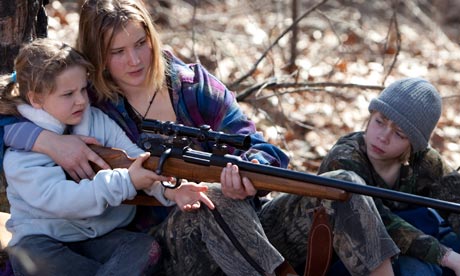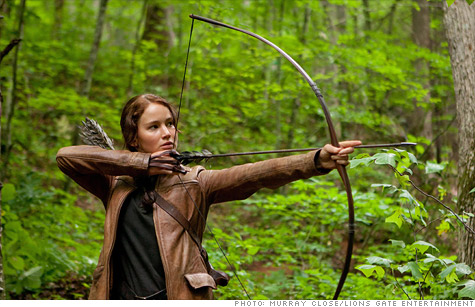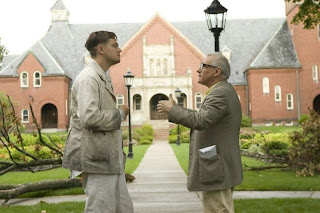HOM caught up with our newly signed baseball correspondent, Nathan Clinkenbeard. We talked baseball and movies. Clink has watched a lot of both.
HOM: Brad Pitt has never played baseball. I'm not even sure he knows how to play baseball. It was most obvious to me that this is the case when he stormed into the locker room and smashed the cooler with a bat. He then braced himself on his waist with the bat in his right hand. I almost felt bad for him for a second. It was the way he was holding the bat. The thinner handle part was in between his fingers, I think. The angle at which he was holding it, the way that it made him feel he had to do something with it. In another way, he just noticed that he was holding a bat. It was just all wrong. A baseball player, especially one as experienced as Billy Beane, would never notice a bat in their hands. And they would never split their middle and pointer finger with the handle. I'm pretty sure such a thing has never been done within 100 yards of a baseball field ever before. In the face of all that he did not know about baseball, Brad Pitt took on this role as GM extraordinaire, Billy Beane. Dude, Clink, tell me what you think about Billy Beane. Is his and the Oakland A's story worth a movie? Was it their story that attracted Brad Pitt to this movie? I ask because here's the thing with me: I'm not sure this story is that exceptional on any level. I mean, as a baseball fan, the A's and their use of "moneyball" is worth a few conversations. But here is what I want to know: is the book/movie just a mere semblance of an anti-establishment, come from behind, David & Goliath story? Has the story been enhanced for Hollywood-Michael-Lewis book/movie sale purposes? Or is this legit? How much attention should the casual (or devout) baseball fan give this story and this movie? To make this question even more wordy, is this movie even about baseball?
CLINK: First of all, thanks for having me on HOM. Been a big fan of the writings on here, and I'm glad I finally get the chance to contribute. Thanks for starting me out with about 10 questions in one. Moneyball is half baseball and half David & Goliath, anti-establishment. It's a decent story but overblown in several ways. What makes the story worth a movie is the persona of Billy Beane. Baseball players are the quirkiest of all professional athletes, and Beane's character definitely makes the movie. Would the movie be the same if Theo Epstein had been the A's GM? Absolutely not. It would probably be more like an episode of Doogie Howser, MD.
Baseball fans should not take Moneyball as the gospel. There's some merit to the story, but I'd say there's a lot left out as to why the A's were so successful from 2001-03.
Oh, and that Pitt scene you referenced was definitely hilarious. The guy wasn't an athlete, and he doesn't even like sports, which drops him down a few notches in my book. I also wondered what he had in place of his dip/chew. As an amateur in that field, I can't really grade him on his tobacco skills.
HOM: What do you know about the history of Billy Beane's scheme? Was he the first one to use it?
CLINK: I'm not sure you can say Beane was the first one to use it. Sabermetrics picked up steam in the mid 1990s, but Beane was really the first to make it and Moneyball "popular" in today's culture. He embraced the philosophy once his 2001 team was picked apart by other big market clubs. In essence, he needed to find a way to remain competitive with a small budget. What's loss in Moneyball is Beane lucked into having a few young studs that didn't have to be paid huge salaries. Looking at more recent A's teams, they have not been very successful at all.
HOM:Similarly, let's talk about how freaking good that A's team was. http://en.wikipedia.org/
CLINK: The middle of that lineup with Tejada, Chavez and Jermaine Dye was legit that year. The biggest misconception about "Moneyball" is the starting pitching for the Oakland A's that year. Michael Lewis didn't mention it in the book, and you only see a glimpse of Tim Hudson in the movie. Hell, in the movie you only see Tim Hudson getting shelled, so the uneducated baseball fan is probably thinking, "Man, that Hudson guy sucked, and they won despite him." Wrong. This team had the Big Three in Hudson, Zito and Mulder. These guys won 57 games between them, and Zito won the AL Cy Young in 2002. Does this team win 100+ games with the Cincinnati Reds pitching staff in 2002? No. The A's were lucky that these three stud arms were all young, and they only had to pay the three of them COMBINED just under $2 million. Zito himself only made $295K as the best pitcher in the AL that year! In my opinion, the Big Three should get significantly more credit than Moneyball for the success of that team.
HOM: Once and for all, what's the impact of this movie/book on managers, GM's, and baseball?
CLINK: It hasn't had as big of an impact as the movie will lead people to believe. But then again, it's a movie, and there's always going to be a pinch of fiction and dramatization to spice up a true story. They flashed up on the screen that the Boston Red Sox won the World Series using Beane's philosophy, but what they don't tell you is the Red Sox still had a payroll beyond $100 million. Teams are applying some Moneyball philosophies, but they're not diving head first into the theory. It's like when you dip your toes into a pool to feel the temperature before you jump in.
The biggest impact has been the use of sabermetrics and most importantly, on-base percentage and on-base plus slugging throughout baseball. More and more experts use it now to determine a player's value as opposed to batting average. Most GMs, managers and scouts, though, have not bought fully into the Moneyball concept. These guys have all been in the game a long time, and most are too stubborn to accept a new philosophy. If Moneyball were to truly change the game, it would take an entire generational rollover to get it going. Maybe it will happen when we're using walkers and wearing adult diapers.
HOM: What about the Pitt - Jonah Hill combo? I mean Pitt was obviously the man in this movie but I don't think any of it works without Jonah Hill. He was pretty good, huh?
CLINK: I enjoyed seeing Jonah Hill step out of the comedy genre and deliver a believable performance as Beane's assistant Peter Brand. There were a couple times though where it looked like Hill was trying to be serious, and he was coming off as comical. Pitt and Hill seemed to have a chemistry throughout the film that made it work.
The guy I think is vastly underrated is Philip Seymour Hoffman. That guy can act. As a huge baseball fan, his performance as boring, monotone A's manager Art Howe was my favorite. He nailed it big time.
HOM: I want to start a campaign to make a sequel to this movie. It will start out really melodramatic as Billy Beane takes on all this symbolism as a Christ figure, bound to suffer for what he believes in. But then, we find out that Ron Washington is being made manager of the Texas Rangers and the cameras decide to follow him to Texas where he meets the Bush family, Nolan Ryan, and Josh Hamilton - I mean could you get a better character driven plot? It'd be like Major League, but real. Your thoughts? I love Ron Washington is what I'm saying.
CLINK: It already sounds like a better plot than most of the crap Hollywood puts out most of the time. If you get the budget, I'll help write the screenplay. Any time you have GW, Nolan Ryan, Hamilton, Washington and Beane in a movie you're automatically set up for success. Ron Washington is definitely a character, and I wish we could have had a little more of him in Moneyball.
HOM: As a baseball guy, where do you put this in the genre of baseball movies? Better than ________ but not as good as __________? Final thoughts?
CLINK: I know this flick received a Best Picture nominee, but there's no way I could put it up there with the all-time greats like Field of Dreams, Bull Durham, A League of Their Own, Major League I and II and The Sandlot. I'd have to put it somewhere in the middle tier, better than Mr. Baseball but not as good as For The Love of the Game.
HOM: Do the Reds make the playoffs this year?
CLINK: Let's just say I think it's going to be a lot harder than I originally thought at the beginning of the season. The bullpen has really taken a hit, but luckily they still have some very solid arms. My biggest concern is 3B and the production behind Votto in the lineup. That's what is going to make or break this team. If we don't get much from 3B and LF I think we'll be a .500 team. I believe they will get it done and make the playoffs.



.png)
.png)
.png)







